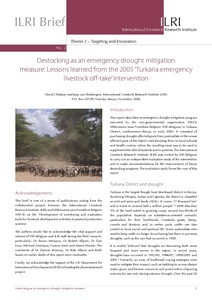Resource information
This report describes an emergency drought mitigation program executed by the non-governmental organization (NGO) Vétérinaires Sans Frontières Belgium (VSF-Belgium) in Turkana District, northwestern Kenya, in early 2005. It consisted of purchasing drought-affected goats from pastoralists in the worse affected parts of the district and donating them to local schools and health centres, where the resulting meat was to be used to supplement the diet of students and in-patients. The International Livestock Research Institute (ILRI) was invited by VSF-Belgium to carry out an independent evaluation study of the intervention and to make recommendations for the improvement of future destocking programs. The evaluation study forms the core of this report. The brief starts with a discussion on previous destocking initiatives and the current intervention: the drought of 2005 of Turkana District. Then it continues with the evaluation of TELO: The Actor Network Theory. The TELO intervention had six specific objectives and the results are presented in relation to each in turn - to increase household cash income among pastoralists; to reduce pressure on water and pasture resources; to increase food security for vulnerable school children; to improve utilisation of assets with livestock owners gaining benefit from vulnerable livestock before the condition of the livestock deteriorates beyond the point of selling; to increase access to funds made available to livestock owners for future restocking; to use the money saved from school feeding program for school fees and/or other relevant projects for pastoralists' schools children. In addition the results are also considered in relation to the four stages of ANT, namely identification of problems and driving forces; identification of each agent's interests; enrolment of the actors and actants; and mobilization. The report ends with summaries of other issues and constraints, and recommendations for improvement of future destocking programs.



